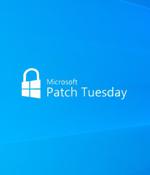Security News

Security researchers at WithSecure, previously F-Secure Business, found that it is possible to partially or fully infer the contents of encrypted messages sent through Microsoft Office 365 due to the use of a weak block cipher mode of operation. Organizations use Office 365 Message Encryption to send or receive emails, both external and internal, to ensure confidentiality of the content from destination to source.

Microsoft has begun to kill off the Microsoft Office brand, with plans to rebrand its Office.com and Office cloud-based apps to Microsoft 365 in the near future. In 2020, Microsoft rebranded Office 365 to Microsoft 365 and started to heavily push the subscription-based productivity suite to both the enterprise and consumers.

Microsoft has now made it possible to receive notifications about new security updates through a new RSS feed for the Security Update Guide. Typically, Microsoft discloses new vulnerabilities twice a month, the bulk being the monthly Patch Tuesday and when Microsoft fixes vulnerabilities in Microsoft Edge.

Microsoft has added command-and-control traffic detection capabilities to its Microsoft Defender for Endpoint enterprise endpoint security platform.The C2 connections are detected by the Defender for Endpoint's Network Protection agent by mapping the outbound connection's IP address, port, hostname, and other values with data from Microsoft Cloud.

Microsoft is rolling out its usual host of cloud security features and services at this week's Ignite 2022 conference, with the focus on what's happening in and outside the firewall. Protecting against sensitive information being shared by teams is also a theme, according to the show briefing, although some of the newly-announced security features have been previewed with Redmond Microsoft 365 E5 license users.

Microsoft reminded customers that all editions of Windows 10, version 21H1, would reach the end of servicing on December 13, 2022. Microsoft said in an update to the Windows health dashboard that systems running Windows 10 21H1 will no longer receive security updates.

Microsoft's Patch Tuesday update for the month of October has addressed a total of 85 security vulnerabilities, including fixes for an actively exploited zero-day flaw in the wild. Of the 85 bugs,...

Let's start off with what Redmond didn't fix: two Exchange Server bugs dubbed ProxyNotShell that have been exploited by snoops as far back as August. A month later, Zero Day Initiative purchased the bugs and disclosed them to Microsoft.

October 2022 Patch Tuesday is here, with fixes for 85 CVE-numbered vulnerabilities, including CVE-2022-41033, a vulnerability in Windows COM+ Event System Service that has been found being exploited in the wild.CVE-2022-41033 is an elevation of privilege vulnerability in the Windows COM+ Event System Service, which automatically distributs events to Component Object Model components.

Today is Microsoft's October 2022 Patch Tuesday, and with it comes fixes for an actively exploited Windows vulnerability and a total of 84 flaws. The above counts do not include twelve vulnerabilities fixed in Microsoft Edge on October 3rd. For information about the non-security Windows updates, you can read today's Windows 10 KB5018410 and KB5018419 updates and the Windows 11 KB5018427 update.